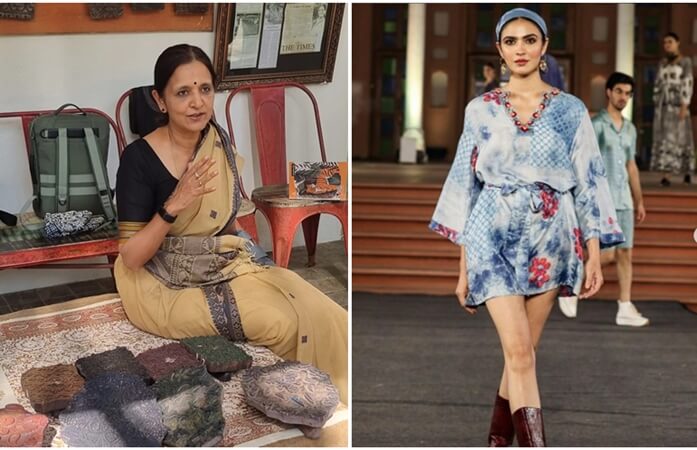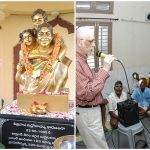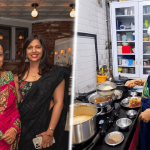Far from the glitters of ‘Sabyasachi fashion’ at the Met Gala 2024, the age-old ethnic beauty of India is being preserved and nurtured in one of the humble, sustainable, organic forms – Hand Block Printing – at Tharangini Studio. The oldest hand block print studio in Bengaluru City, Tharangini got a new lease of life when Padmini Govind gave up her thriving American career in 2008 to carry on her mother’s legacy in India.
NRIs coming back home and joining the lucrative family business, are not rare stories. But Padmini is an exception as she bade a goodbye to America only to save her mother’s love and life – Tharangini Studio – a small home business dealing in silk fabric printing then. She would have become a CEO like Dhivya Suryadevara and Devika Bulchandani if she had continued pursuing her American Dream from her last job as VP – Business Development in Dallas, Texas.

PC: Tharangini Studio @ Instagram | Padmini Govind (left)
The family Padmini was born into has had a great appreciation for art and culture patronized by the royals in the erstwhile princely states. Her grandfather held prestigious posts like Deewan in the royal families of Mysore and Gwalior. Hence, her mother Lakshmi Srivathsa grew up inclined towards fine arts and learned various handicrafts, especially hand block printing, at Triveni Kala Sangam, a well-known arts school in Delhi. Her father was an engineer.
Padmini studied computer science in Bangalore and earned a master’s degree in the United States though she had a latent streak of admiration for fine arts in her blood. Whenever her mother visited her in the US, she would take her to art workshops at museums there, and thus, she developed a bond with her mother’s work – far from the ‘rate’ race in the corporate sector. After 18 years of stay in America, she returned home with her husband and kids when her mother’s health deteriorated in 2008.
She took over the reins of Tharangini studio with little knowledge of it before her mother breathed her last in 2011. However, her wealth of experience in media, fintech and other sectors made a huge difference to the family heritage. She navigated the changing landscape fraught with such challenges as the growing like for low-quality variants of silk fabric, proliferation of mechanized printing, Indian sarees having become an occasional wear, etc. Precisely, the silk industry of India was experiencing a major shift.
Draped in suti (cotton) saris, Padmini appears very unlike her previous corporate persona in the US. She made Tharangini, which her mother had started in a garden shed, one of the most sought-after fabric art studios for ethnic fashion and home furnishing brands at home and abroad, with her media-savvy approach, business acumen, fintech knowledge, and contacts in America. A bulk order of hand-printed silk sarees for the cabin crew of Royal Nepal Airlines was the first international deal that catapulted Tharangini Studio to a new high under Padmini.
Unlike other fabric print studios that have faded in the glare of fast fashion promoted by ecommerce deals and discounts, Padmini’s Tharangini Studio stands tall. It strives to keep traditional hand block printing adaptable to millennials’ contemporary fashion, without compromising the organic process and the quality of natural dyes. Adaptability is the key to the survival, growth and expansion of Tharangini Studio in Bengaluru. Padmini left no stone unturned in popularizing this ancient craft (dating back to the Indus Valley civilization) through workshops at design colleges across India and beyond.
Today, Tharangini has the largest collection of wooden blocks for diverse printing in the country. Padmini is carrying on not only the legacy of her mother but also Kamaladevi Chattopadhyay, who had mentored her mother, Lakshmi. It was Kamaladevi who persuaded Mahatma Gandhi to let women join the salt satyagraha and actively promoted ethnic handicrafts during and after the freedom movement. A program by United Nations Women in the sustainable fashion category adjudged Tharangini Studio as one of the best 10 global artisan studios against 400 entries from 60 countries.







